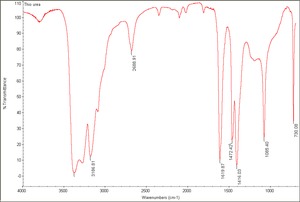Difference between revisions of "Thiourea"
Jump to navigation
Jump to search
m (Text replace - "\[http:\/\/cameo\.mfa\.org\/materials\/fullrecord\.asp\?name=([^\s]+)\s(.*)\]" to "$2") |
|||
| (4 intermediate revisions by 2 users not shown) | |||
| Line 1: | Line 1: | ||
== Description == | == Description == | ||
| − | Shiny, white, crystals that can dissolve salts of [[silver|silver]], [[gold|gold]], and [[platinum|platinum]]. Thiourea is used in photography for toning and for removing stains on negatives. However, it can also act as a powerful fogging agent and care must be used to prevent cross contamination of thiourea solutions with other processing aids. Thiourea is often an active ingredient in [[ | + | Shiny, white, crystals that can dissolve salts of [[silver|silver]], [[gold|gold]], and [[platinum|platinum]]. Thiourea is used in photography for toning and for removing stains on negatives. However, it can also act as a powerful fogging agent and care must be used to prevent cross contamination of thiourea solutions with other processing aids. Thiourea is often an active ingredient in [[Silver%20Dip|silver dip]] type tarnish removal solutions. However, when thiourea is incompletely removed from a metal, it can form an insoluble adduct. Thiourea is also used to accelerate the [[vulcanization|vulcanization]] of [[rubber|rubber]]. |
== Synonyms and Related Terms == | == Synonyms and Related Terms == | ||
thiocarbamide; sulfourea; sulfocarbamide; thiurea | thiocarbamide; sulfourea; sulfocarbamide; thiurea | ||
| + | [[[SliderGallery rightalign|Thio urea.TIF~FTIR(MFA)]]] | ||
| − | + | == Risks == | |
| − | == | + | * Suspected carcinogen. |
| + | * Skin contact causes irritation. | ||
| + | * Should not be used on metals containing more than 7% copper. | ||
| + | * ThermoFisher: [https://fscimage.fishersci.com/msds/23420.htm MSDS] | ||
| + | == Physical and Chemical Properties == | ||
Soluble in water, ethanol, ammonium thiocyanate solutions. Slightly soluble in ether. | Soluble in water, ethanol, ammonium thiocyanate solutions. Slightly soluble in ether. | ||
| Line 22: | Line 27: | ||
|- | |- | ||
! scope="row"| Melting Point | ! scope="row"| Melting Point | ||
| − | | 176-172 | + | | 176-172 C |
|- | |- | ||
! scope="row"| Density | ! scope="row"| Density | ||
| − | | 1.405 | + | | 1.405 g/ml |
|- | |- | ||
! scope="row"| Molecular Weight | ! scope="row"| Molecular Weight | ||
| Line 31: | Line 36: | ||
|} | |} | ||
| − | == | + | == Resources and Citations == |
| − | |||
| − | |||
| − | |||
| − | |||
| − | |||
| − | |||
* Michael McCann, ''Artist Beware'', Watson-Guptill Publications, New York City, 1979 | * Michael McCann, ''Artist Beware'', Watson-Guptill Publications, New York City, 1979 | ||
Latest revision as of 12:12, 8 June 2022
Description
Shiny, white, crystals that can dissolve salts of Silver, Gold, and Platinum. Thiourea is used in photography for toning and for removing stains on negatives. However, it can also act as a powerful fogging agent and care must be used to prevent cross contamination of thiourea solutions with other processing aids. Thiourea is often an active ingredient in silver dip type tarnish removal solutions. However, when thiourea is incompletely removed from a metal, it can form an insoluble adduct. Thiourea is also used to accelerate the Vulcanization of Rubber.
Synonyms and Related Terms
thiocarbamide; sulfourea; sulfocarbamide; thiurea
Risks
- Suspected carcinogen.
- Skin contact causes irritation.
- Should not be used on metals containing more than 7% copper.
- ThermoFisher: MSDS
Physical and Chemical Properties
Soluble in water, ethanol, ammonium thiocyanate solutions. Slightly soluble in ether.
| Composition | (NH2)2CS |
|---|---|
| CAS | 62-56-6 |
| Melting Point | 176-172 C |
| Density | 1.405 g/ml |
| Molecular Weight | mol. wt. = 76.12 |
Resources and Citations
- Michael McCann, Artist Beware, Watson-Guptill Publications, New York City, 1979
- Marie Svoboda, Conservation Survey Index, unpublished, 1997
- The Merck Index, Susan Budavari (ed.), Merck Research Labs, Whitehouse Station, NJ, 12th Edition, 1996 Comment: entry 9505
- G.S.Brady, Materials Handbook, McGraw-Hill Book Co., New York, 1971 Comment: p. 837
- Richard S. Lewis, Hawley's Condensed Chemical Dictionary, Van Nostrand Reinhold, New York, 10th ed., 1993
- The American Heritage Dictionary or Encarta, via Microsoft Bookshelf 98, Microsoft Corp., 1998
- Random House, Webster's Encyclopedic Unabridged Dictionary of the English Language, Grammercy Book, New York, 1997
